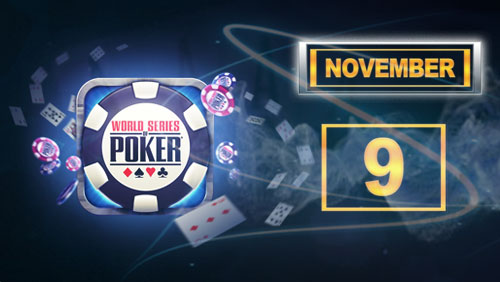The November Nine is coming up next weekend. Did you remember that before I told you just now? I’d nearly forgotten myself before I wrote about the Poker Hall of Fame for last week’s column. I honestly had trouble remembering which nine players were forced to hit pause on their WSOP Main Event tournament lives for four months back in July.
 Thanks to Google I’m now back up to date on Mark Newhouse, Billy Pappas, and the rest of the 2014 November Nine. But the fact that the lineup was able to slip my mind in the first place is a sign of just how far past its time the pause-and-resume-later-for-ratings model of presenting the WSOP on television has travelled. Put simply, it’s time for the November Nine to go.
Thanks to Google I’m now back up to date on Mark Newhouse, Billy Pappas, and the rest of the 2014 November Nine. But the fact that the lineup was able to slip my mind in the first place is a sign of just how far past its time the pause-and-resume-later-for-ratings model of presenting the WSOP on television has travelled. Put simply, it’s time for the November Nine to go.
The November Nine concept was a somewhat bold stroke when it was introduced in 2008. The writing was on the wall with upcoming UIGEA regulations about cut off the flow of satellite winners, meaning a lot fewer people playing (and therefore watching) poker in the U.S. The WSOP’s response helped to goose the ratings on ESPN upward for a bit, and it set the Main Event apart from the glut of poker programming on TV. Some people continued to pay attention to the WSOP when they might have gone searching for other entertainment options, but the November Nine never became a true game-changer. It just moved the end of the original poker tournament to a spot on the calendar where it was never meant to be.
Today, times have changed. There’s drastically less online poker in America, and as a result a lot less poker on TV since the online rooms were nearly the only advertisers before Black Friday. And the product that’s being broadcast today is nowhere near as entertaining as what was aired during the poker boom, which hasn’t helped ratings. For me, at least, that means most of the reasons used to justify messing with the rhythms and momentum of a single tournament are gone.
If the WSOP suits wanted make a solid move with their slowly flagging TV franchise, they’d scrap the November Nine. I don’t expect them to do it because they’re pretty committed to the concept, and we live in a society where almost nobody will back away from a plan once they have set it in motion. But it would be a good move. And if they wanted to be truly bold, they’d not only scrap the November Nine but take the weekend that was once used for resuming a tournament already forgotten by anybody not playing in it and use it to hold a Poker Hall Of Fame Weekend.
It wouldn’t take much creative thinking to to turn it into an event that anyone interested in poker would want to watch. The weekend would start with Friday evening’s Hall Of Fame induction ceremony – ideally at an actual Poker Hall Of Fame Museum. A night honoring the game’s history, along with a few awards for the most successful players at that year’s WSOP, would set the stage for Saturday’s revival of a dormant property – the WSOP Tournament Of Champions. The new TOC would feature the winners of every WSOP tournament throughout the year, along with that year’s living inductees to the Poker Hall Of Fame, if any, playing for a million dollars.
The tournament would give the WSOP Player of the Year, winners of multiple bracelets during the year, and the HOF inductees bonus chips for their starting stacks. Play would be six-handed for the most interesting possible TV product. A little bit of the old school “endurance test” school of tournament play would be introduced by structuring the tournament so the field can be reduced to its final table by sometime early Sunday morning.
Sunday’s TV coverage of the Poker Hall Of Fame Weekend would have something for everyone. A two-hour packaged program would highlight the induction ceremony for the Hall and Day 1 of the TOC, with spotlights for the year’s top performers playing in the tournament. And following that the live (or nearly live) coverage of the six-handed TOC final table would begin. With a reason to be interested in every single player at the table, and the storylines essentially writing themselves because only the year’s most successful players are invited to the field, the Tournament Of Champions would be at least as compelling as most years’ Main Event final tables.
That sounds infinitely more interesting to me than live coverage of nine guys with $2.3 million in past WSOP earnings between them, nearly all of whom I have no feelings about one way or the other, seeing who runs the best over one night. It nods to the game’s history, and it provides a more intriguing TV product than the standard nine-handed WSOP final table. And if it sounds more interesting to me, it probably does to plenty of other people, too. Too bad one of them isn’t an executive at the WSOP. It would be great to have a reason to mark the first weekend of November on my calendar every year instead of trying to remember the week before it why it is that I’m supposed to care.